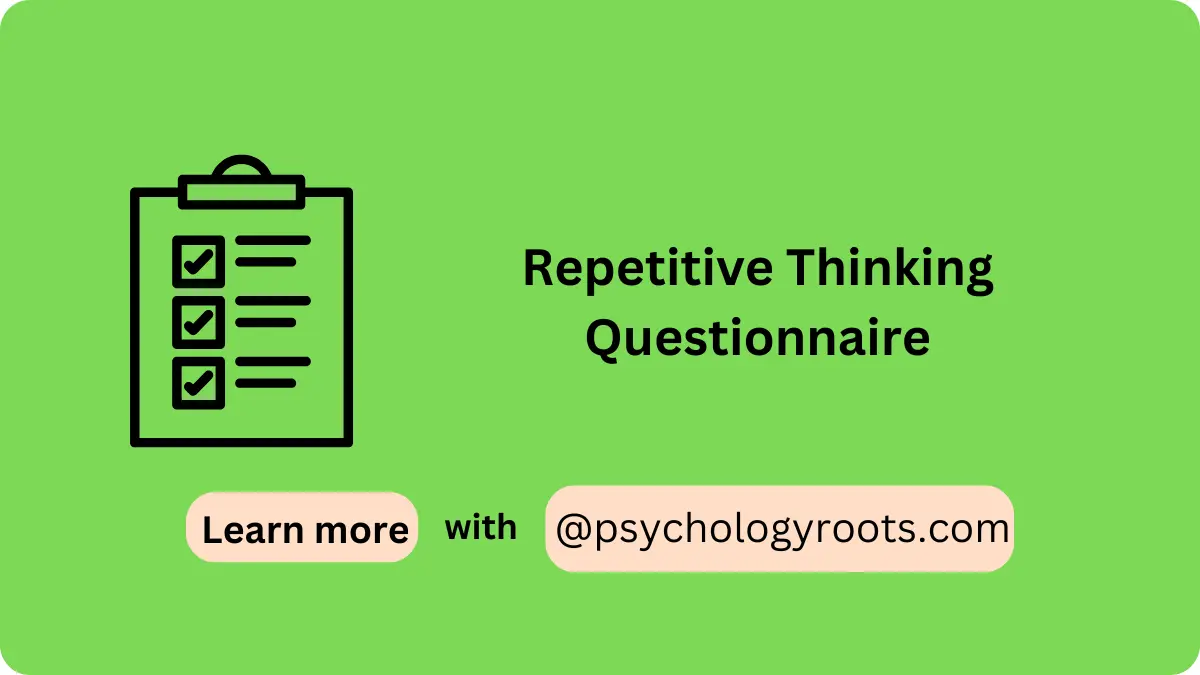Table of Contents
Repetitive Thinking Questionnaire
Here in this post, we are sharing the “Repetitive Thinking Questionnaire”. You can read psychometric and Author information. We have thousands of Scales and questionnaires in our collection (See Scales and Questionnaires). You can demand us any scale and questionnaires related to psychology through our community, and we will provide you with a short time. Keep visiting Psychology Roots.
About Repetitive Thinking Questionnaire
Scale Name
Repetitive Thinking Questionnaire
Author Details
Peter M. McEvoy, Alison E. J. Mahoney, and Michelle L. Moulds
Translation Availability
English

Background/Description
The Repetitive Thinking Questionnaire (RTQ) is a self-report instrument developed to assess repetitive negative thinking (RNT), a cognitive process characterized by persistent and recurrent thoughts about one’s concerns or experiences. RNT is recognized as a transdiagnostic factor implicated in the maintenance of various emotional disorders, including anxiety and depression.
The RTQ was designed to provide a comprehensive measure of RNT that is not specific to any single disorder, thereby facilitating its application across different clinical populations. The questionnaire includes items that evaluate the frequency and nature of repetitive thoughts, with a focus on their negative valence and unproductiveness.
The RTQ has been utilized in both research and clinical settings to better understand the role of RNT in psychological distress and to inform interventions aimed at reducing maladaptive repetitive thinking patterns.
Administration, Scoring and Interpretation
- Obtain a Copy: Access the RTQ through the original publication in the Journal of Anxiety Disorders or by contacting the authors for permission to use the instrument in research or clinical practice.
- Explain the Purpose: Inform participants that the RTQ aims to assess the frequency and nature of their repetitive negative thinking patterns to better understand their cognitive processes and inform potential interventions.
- Provide Instructions: Instruct participants to respond to each item based on their experiences over a specified period (e.g., the past week), using the provided Likert scale to indicate the extent to which each statement applies to them.
- Approximate Time: The RTQ typically takes approximately 10–15 minutes to complete.
- Administer the Scale: Ensure participants complete the questionnaire in a quiet, comfortable environment that allows for honest and thoughtful responses, free from external pressures or distractions.
Reliability and Validity
The RTQ has demonstrated strong psychometric properties. Studies have reported high internal consistency, with Cronbach’s alpha coefficients indicating reliable measurement of the RNT construct. The RTQ’s validity is supported by significant correlations with related constructs, such as anxiety, depression, and metacognitive beliefs, confirming its effectiveness in assessing repetitive negative thinking across various populations.
Available Versions
31-Items
Reference
McEvoy, P. M., Mahoney, A. E., & Moulds, M. L. (2010). Are worry, rumination, and post-event processing one and the same?: Development of the Repetitive Thinking Questionnaire. Journal of anxiety disorders, 24(5), 509-519.
Important Link
Scale File:
Frequently Asked Questions
What is the purpose of the Repetitive Thinking Questionnaire (RTQ)?
The RTQ is designed to assess the frequency and nature of repetitive negative thinking patterns, which are implicated in various emotional disorders.
Who developed the RTQ?
The RTQ was developed by Peter M. McEvoy, Alison E. J. Mahoney, and Michelle L. Moulds, as published in their 2010 study.
How is the RTQ structured?
The questionnaire includes items that evaluate the frequency and nature of repetitive thoughts, focusing on their negative valence and unproductiveness.
How is the RTQ administered?
Participants self-report their experiences of repetitive negative thinking over a specified period, responding to each item using a Likert scale.
Is the RTQ a reliable and valid measure?
Yes, the RTQ has demonstrated high reliability and validity in assessing repetitive negative thinking across various populations.
Disclaimer
Please note that Psychology Roots does not have the right to grant permission for the use of any psychological scales or assessments listed on its website. To use any scale or assessment, you must obtain permission directly from the author or translator of the tool. Psychology Roots provides information about various tools and their administration procedures, but it is your responsibility to obtain proper permissions before using any scale or assessment. If you need further information about an author’s contact details, please submit a query to the Psychology Roots team.
Help Us Improve This Article
Have you discovered an inaccuracy? We put out great effort to give accurate and scientifically trustworthy information to our readers. Please notify us if you discover any typographical or grammatical errors.
Make a comment. We acknowledge and appreciate your efforts.
Share With Us
If you have any scale or any material related to psychology kindly share it with us at psychologyroots@gmail.com. We help others on behalf of you.